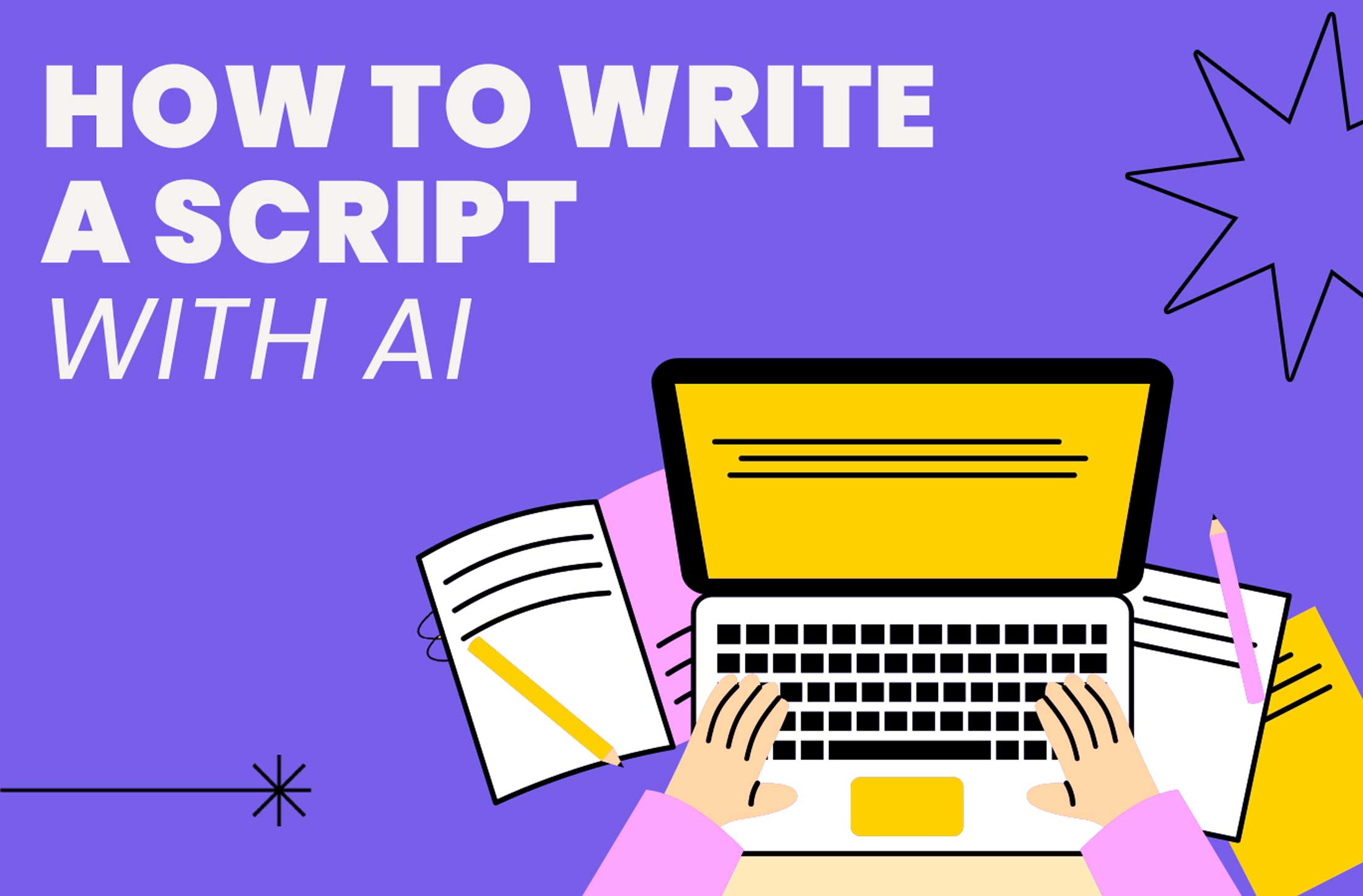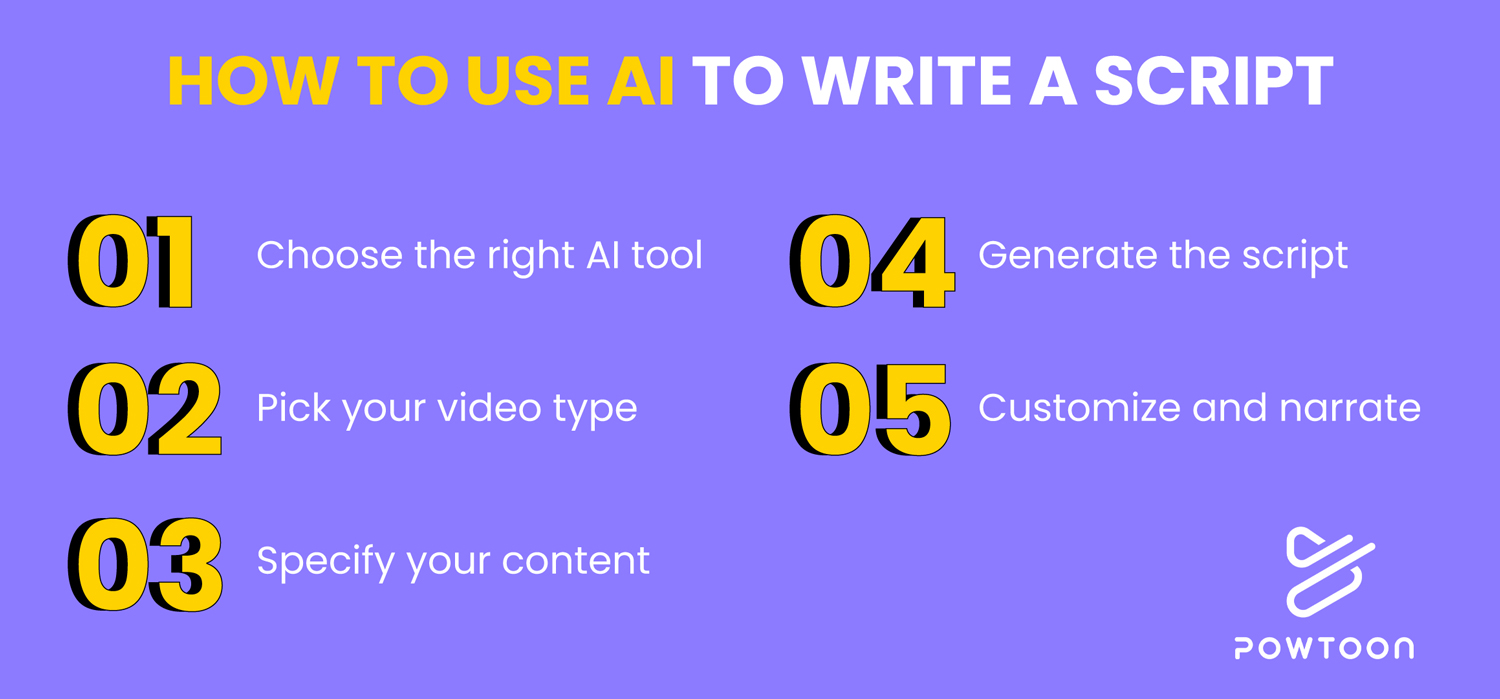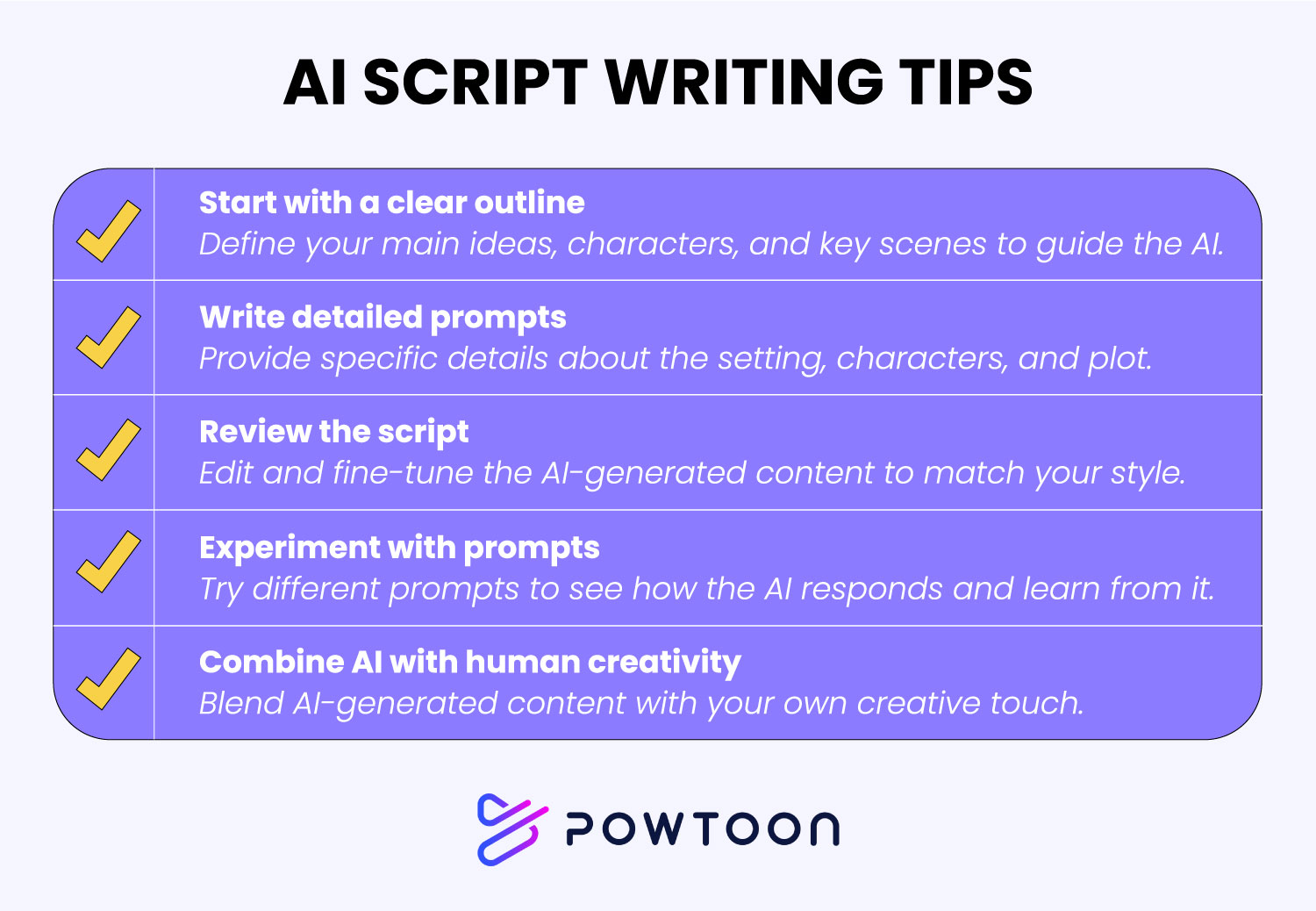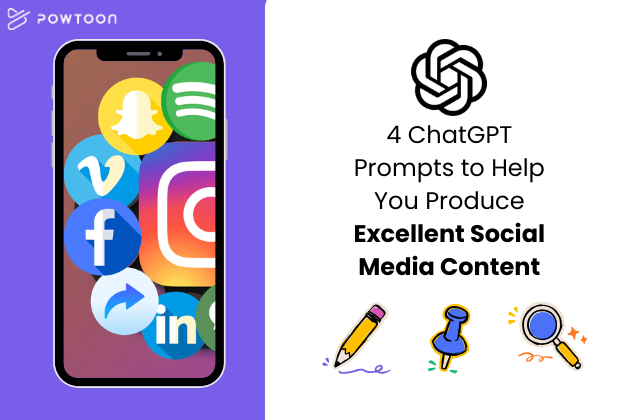
How to write a script with AI
If you’re looking for an easier way to write scripts, AI script writing tools might be just what you need. AI is changing how we create content, making the scriptwriting process faster and more efficient. By using advanced algorithms, AI can help you generate ideas, improve dialogue, and format your scripts according to specific industry standards. Whether you’re working on a film, an ad, or any other type of content, AI tools can make the job much simpler. In this article, you’ll learn how AI works, how to write a script with AI, and how to use AI to improve your scriptwriting process.
Understanding AI-powered script writing
So, what is AI script writing? AI technology in script writing works by analyzing huge amounts of text from existing scripts and literature. It uses natural language processing to understand how language works, including context and tone. This allows the AI to generate dialogue, create characters, and suggest plot twists that feel natural and engaging.
The AI looks at patterns in the data it’s trained on, learning how to structure a script and develop a storyline. When you input your ideas, AI can offer suggestions and even help format your script according to industry standards. In a nutshell, AI acts like a smart assistant that helps you produce a script more efficiently without losing your creative touch.
Benefits of using AI for writing your script
Using AI to write your script comes with its advantages. It can save you time by automating repetitive tasks, boost your creativity with fresh ideas, and make the whole writing process more accessible.
- Efficiency: AI speeds up the scriptwriting process by automating repetitive tasks. It can quickly generate dialogue, suggest plot twists, and format your script, saving you a lot of time and effort. This means you can focus more on your story and less on the technical details. Instead of spending hours on formatting or brainstorming, you can let the AI handle these tasks and spend more time developing your plot and characters. The efficiency AI brings can also help you meet tight deadlines without sacrificing the quality of your work.
- Creativity: AI boosts your creativity by providing fresh ideas and new perspectives. It analyzes tons of data to suggest unique storylines, character traits, and plot developments you might not have thought of. By giving you new angles to consider, AI can push the limits of your creativity and make your scripts more original.
- Accessibility: AI script writing tools are easy to use, making high-quality scriptwriting accessible to everyone. Whether you’re a beginner or an experienced writer, these tools can help you create professional scripts easily. This means you don’t need to invest in expensive courses or spend years mastering script writing techniques: AI tools provide you with all the foundation and guidance you need.
How to use AI to write a script
Platforms like Powtoon’s AI script generator can revolutionize your approach to scriptwriting. To get you started on using AI tools for scriptwriting, we’ve made a general step-by-step guide outlining the process, from planning your scenes to finalizing your script.

Choose the right AI tool
With a number of options out there, you’re spoilt for choice when it comes to finding an AI script writing tool that meets your needs. Our script writer is a top choice, offering an intuitive interface and powerful features to streamline your writing process.
Choose your video type
Start by selecting the type of video you want to create. Whether it’s a tutorial, commercial, or narrative, define your project so the tool can tailor the script to those standards.
Specify your content
Detail what your video is about and the tone you want to set. This helps the AI script writer generate a script that matches your vision, including voice-over text, on-screen text, and scene descriptions.
Generate your script
Click ‘Generate script’ to create your script automatically. Powtoon’s AI script generator will produce everything from voice over and on-screen text to slide descriptions.
Customize and narrate
Adjust and refine the script so it matches your vision. When your script is ready, you can copy and paste it anywhere, or use our studio to turn your script into a video—courtesy of our AI text-to-speech tool.
Choosing the right AI script writing tool
Selecting the best AI script writer is key to making your writing process smooth and enjoyable. There are several factors to consider before making your decision.
- Features: Look for tools that offer a wide range of features. Beyond basic script generation, advanced tools can help with idea brainstorming, character development, and even plot structuring. Some tools provide templates for different types of scripts, like movies, TV shows, or advertisements, which can be incredibly useful. Features like real-time collaboration and version tracking can also be beneficial if you’re working with a team.
- Usability: Usability is crucial, especially if you’re new to AI tools. Look for a tool with a clean, user-friendly interface that’s easy to navigate. A good AI script writing tool should make the process straightforward, from inputting your initial ideas to generating and editing your script. Tools with tutorials or a strong user community can also help master the process quickly.
- Compatibility with needs: Make sure the tool fits your specific needs. If you’re writing for a particular genre or medium, check if the tool has specialized features for that. Some tools are ideal for screenwriting, offering features like scene breakdowns and character creation. Others might be better for marketing content or educational videos. Consider how the tool fits into your workflow and works with your existing software.
Best practices for AI script writing
Using AI for scriptwriting can do wonders if you know the right techniques. Let’s talk about the best practices to streamline your workflow and create great scripts.

Start with a clear outline
First things first: have a clear vision of what you want your script to be. Define your main ideas, characters, and key scenes. This helps the AI generate content that aligns with your vision. For example, if you know the beginning, middle, and end of your story, the AI can help fill in the gaps in the narrative.
Write detailed prompts
Provide the AI script writer with detailed and specific prompts. The more information you give, the better the AI can generate relevant and high-quality content. Include details about the setting, characters, and plot points. For instance, instead of just saying, “Write a scene in a park,” you could say, “Write a scene in a busy city park where two strangers meet and discover they share a secret past.”
Review
Always review the AI-generated script. While AI can create impressive content, it’s important to fine-tune and edit to make sure it fits your style and sounds natural. Add your personal touch to make the script truly yours. Look for areas where the AI’s suggestions might need improvements to better match the tone of your project.
Experiment
Don’t be afraid to experiment with different prompts and approaches. AI tools learn and improve over time, so keep trying until you get the desired results. Try various scenarios and see how the AI responds. The more you experiment, the more you’ll understand how to use AI to write a script and get the best output from the tool.
Combine AI with human creativity
Use AI to handle the heavy lifting, like generating dialogue and scenes, but rely on your creativity for the final polish. Combining AI’s efficiency with your creative insights results in the best scripts. Think of AI as a collaborator, and keep in mind that it knows very little about you personally.
Challenges of AI script writing
While AI-powered scriptwriting tools offer many benefits, they also come with certain limitations. Knowing those limitations can help you get the most out of AI in your script writing process.
- Lacks creativity: One major challenge is the lack of creativity. AI can analyze and generate text based on patterns, but it doesn’t have human creativity or intuition. This means it might struggle to create unique and original stories. To solve this problem, use AI for brainstorming and initial drafts, but inject your own creativity and ideas.
- Does not fully understand context: Another challenge is the inability to fully understand context. AI can struggle to grasp the specifics of language, which can affect the accuracy of its feedback and suggestions. To mitigate this, provide detailed and clear prompts to guide the AI. Your oversight is key to maintaining the script’s authenticity.
- Lacks human touch: While AI can offer real-time feedback and suggestions, it lacks the emotional intelligence and subjective judgment of human writers. It can’t fully replace the value of human collaboration in the creative process, so use it as a supportive tool rather than a replacement. Combining AI-generated suggestions with human insight and creativity produces richer and more emotional scripts.
- Dependent on input data: AI’s dependence on input data can also pose problems. The quality of AI suggestions is only as good as the input data. If the data is incomplete or biased, the AI’s recommendations may not be accurate or helpful. To overcome this, be sure the input data you provide is well-rounded. Regularly updating the AI with diverse and high-quality data improves its output.
- Poses issues of cost and accessibility: Cost and accessibility can be barriers. Some AI script writing tools can be expensive or require specialized technical knowledge. That being said, you can explore different AI tools to find one that fits your budget and skill level. Look for tools with user-friendly interfaces and affordable pricing plans, and take advantage of free trials to test the tools before committing.
Future trends in AI script writing
The field of AI script writing is evolving rapidly, and several exciting trends are on the horizon. As technology advances, AI tools are becoming more sophisticated, offering writers new ways to improve their processes and produce high-quality scripts. These trends promise to make AI an even more valuable ally in the world of scriptwriting.
Enhanced creativity
Future AI tools will likely become more creative, offering even more unique and original ideas. As AI algorithms get smarter, they will better understand storytelling nuances, helping writers generate more professional scripts.
Improved context understanding
AI is expected to improve its understanding of context, tone, and elements like sarcasm and irony. This will make AI-generated scripts more accurate and relevant.
Accessibility and user-friendliness
AI tools will become more accessible and easier to use, with clean interfaces and more affordable pricing. This will allow more writers, regardless of their technical expertise or budget, to benefit from AI in their scriptwriting process.
Integration with other technologies
AI scriptwriting tools will likely integrate more with other technologies, such as virtual reality (VR) and augmented reality (AR). This integration could open up new possibilities for interactive and immersive storytelling.
Data-driven insights
Future AI tools will provide more advanced data-driven insights, helping writers understand audience preferences and market trends. This information will enable writers to tailor their scripts to better meet the needs and desires of their audience.
The bottom line
AI script writing tools are transforming the way we create scripts, making the process easier, faster, and more accessible. These tools offer a variety of features, such as natural dialogue generation, creative idea suggestions, user-friendly interfaces, and versatile content options, all designed to meet your writing needs and preferences.
However, each tool has its own limitations, such as limited contextual understanding or fewer customization options. It’s important to consider these factors when selecting the best AI script writing tool for your specific needs.
Related reading:
- What is AI script writing? Everything you need to know
- The best 10+ AI video editors of the year
- 10+ best AI video generators of 2024
How to write a script with AI FAQ
What is an AI script writer, and how does it work?
An AI script writer is a tool that uses artificial intelligence to help you write scripts. It analyzes text data and uses algorithms to create dialogue, develop characters, and suggest plot ideas, making the scriptwriting process easier and faster.
Can anyone, regardless of experience, use AI to write a script?
Yes, anyone can use AI to write a script, whether you’re a beginner or a professional. Powtoon’s AI tools are designed to be easy to use, so you don’t need to be an expert to get started.
How do I choose the right AI script writing tool for my needs?
To choose the right AI script writing tool, think about what features you need, how easy the tool is to use, and how well it fits with your workflow. Look for tools that match your specific needs, like dialogue generation or plot development.
Are there any limitations to using AI for script writing?
Yes, there are some limitations. AI might not always understand complex contexts or the nuances of language. It can generate text based on patterns but doesn’t have human creativity. Always review and edit the AI-generated content to make sure it meets your standards.
Is AI script writing suitable for all types of scripts?
Yes, you can use AI script writing tools for many types of scripts, like movies, TV shows, and ads. However, its effectiveness depends on the complexity and specific needs of the script. It’s best used as a tool to support your writing, not replace it entirely.
Can AI accurately capture the tone and style required for a specific script?
Yes, AI can approximate tone and style based on its training data, but it might not always get it perfect. Giving detailed prompts and making adjustments during editing ensures that the tone and style match your vision.
What is the best software for writing scripts with AI?
There are several popular AI script writers available online, including Powtoon, ChatGPT, Jasper, ShortlyAI, Writesonic, and Writecream. Look for one that fits your needs, whether it’s generating dialogue, structuring plots, or formatting scripts. Try out a few to see which one works best for you.







